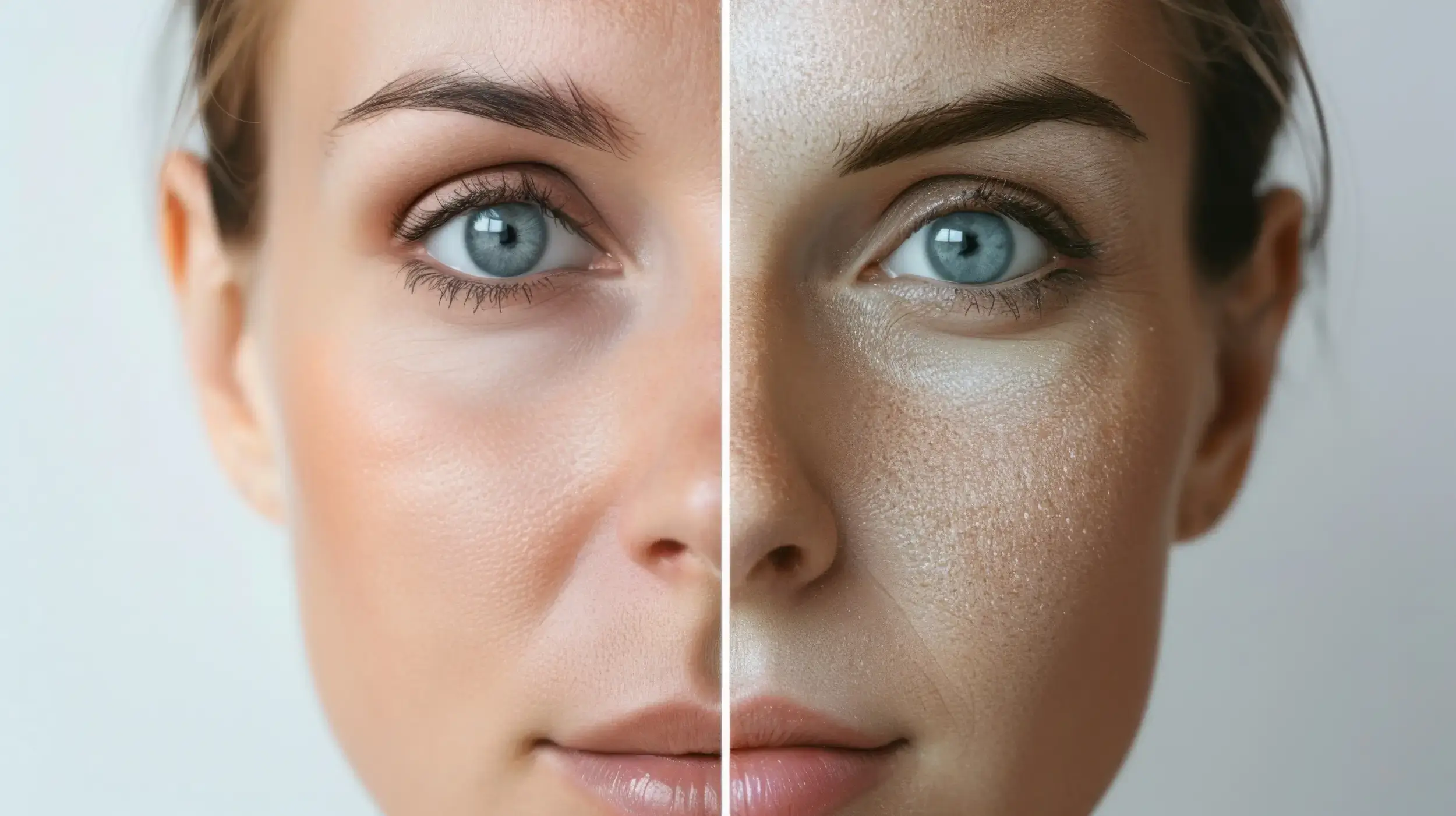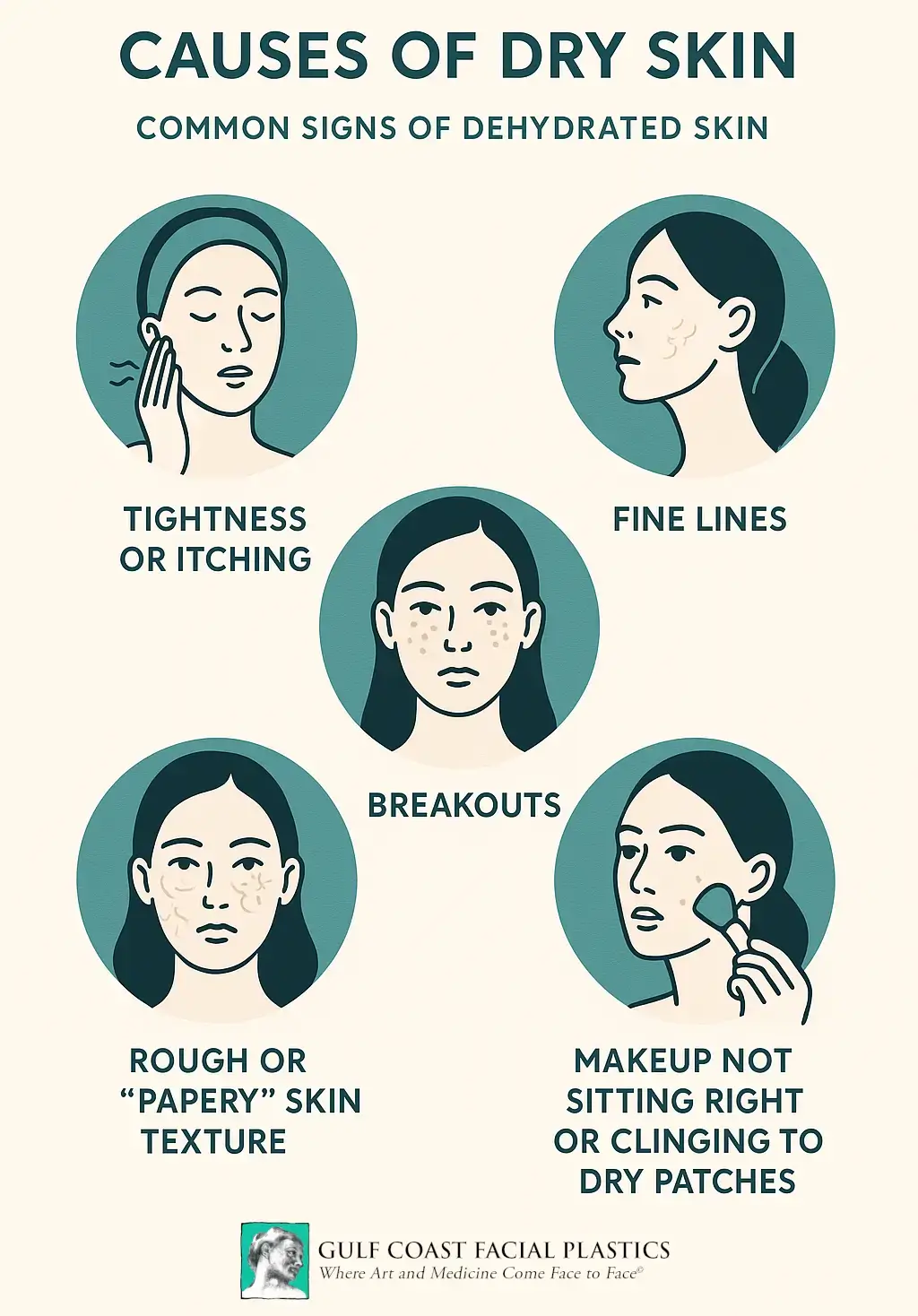
Think Your Skin Is Just Dry? It Might Be Dehydrated Instead
If your skin feels off lately (tight, dull, flaky, or breaking out for no clear reason), dehydration might be the hidden culprit. It’s a common condition, especially in Florida’s hot, humid climate, and many people mistake it for dry skin. While the two might sound similar, dehydrated skin is a different issue entirely. And the good news? It’s often easier to fix than you think.
In simple terms, dry skin lacks oil. Dehydrated skin lacks water. You can even have both at the same time, which is why reaching for rich creams or oils doesn’t always solve the problem. Treating dehydrated skin like dry skin can sometimes make things worse. That can lead to clogged pores, uneven texture, and even more irritation.
We see this mix-up all the time. Helping patients properly rehydrate their skin is often the first step toward clearing breakouts, smoothing rough patches, and softening fine lines. Once you know how to recognize and treat dehydration, you can start restoring your skin’s natural glow with the right support.
What Is Dehydrated Skin, Really?
Dehydrated skin is a temporary condition where your skin lacks water, not oil. It can happen to any skin type, including oily or acne-prone skin.
When your skin feels tight, dull, or irritated, dehydration is often to blame. Unlike dry skin, which is a lifelong skin type, dehydrated skin is a condition that can come and go depending on your habits, environment, and skincare routine. And because the symptoms can mimic dryness, it’s easy to misdiagnose—and mistreat—your skin without realizing it.
Dry Skin vs. Dehydrated Skin
Dry skin is a skin type. It means your skin naturally produces less oil, often leading to flakiness, rough patches, or sensitivity year-round. Dehydrated skin, on the other hand, is a condition where your skin is lacking water. This can happen to anyone, even those with oily or combination skin.
In fact, one of the biggest mistakes people make is assuming that tight or flaky skin means they need heavier creams or oils. While that might help dry skin, it can actually clog pores and cause breakouts in dehydrated skin, especially if your skin is already oily. It’s not just about adding moisture but about adding the right kind of hydration.
What Causes Skin to Become Dehydrated
In Florida, we see dehydrated skin all the time. Between the constant sun exposure, high humidity, air conditioning, and outdoor lifestyle, your skin is constantly losing moisture. Other common triggers include using harsh skincare products, drinking alcohol, not getting enough sleep, or simply not drinking enough water.
Even skincare enthusiasts or patients receiving treatments at our office can struggle with dehydration. When the skin barrier is compromised due to a lack of water, it becomes more reactive and sensitive, and that can interfere with the results of facials, laser treatments, or injectables. That’s why restoring hydration is often one of the first things we recommend when building a skincare plan.
How to Tell if Your Skin Is Dehydrated
Dehydrated skin doesn’t always show up the way you’d expect. It can affect all skin types, including oily or acne-prone skin, and the symptoms often overlap with other concerns like dryness or sensitivity. Paying close attention to how your skin looks and feels can help you spot the signs early and treat the root cause instead of just the surface symptoms.
Common Signs of Dehydrated Skin
Dehydrated skin can look and feel different depending on your skin type, but there are some telltale signs to watch for. You might notice:
- Tightness or itching
- Dull or uneven skin tone
- Fine lines that seem to appear out of nowhere
- Rough or “papery” skin texture
- Breakouts or congestion in oily areas
- Makeup not sitting right or clinging to dry patches
If any of these sound familiar, your skin may be missing water, not oil. These symptoms are especially common after sun exposure, long flights, or using strong exfoliants or acne products.
The Skin Pinch Test (and Why It Works)
One simple way to check for dehydration is the skin pinch test. Gently pinch a small section of skin on your cheek, then release and observe how quickly it bounces back. If your skin is slow to return to normal, it could be a sign of dehydration.
This test isn’t a medical diagnosis, but it can give you a quick idea of how well your skin is holding onto moisture. Combined with the symptoms above, it’s a helpful clue that your skin may need a hydration reset.
Can Dehydrated Skin Really Cause Acne, Redness, or Wrinkles?
Yes, it absolutely can. Dehydration affects more than just how your skin feels—it impacts how your skin functions. When your skin is lacking water, it can throw off your entire skincare routine and make common concerns harder to manage.
Here’s how:
- Dehydrated skin can lead to breakouts. When your skin senses a lack of hydration, it often overcompensates by producing more oil. This excess oil mixes with dead skin cells and can clog pores, leading to acne and congestion.
- It can also increase redness and sensitivity. Without enough water, your skin barrier becomes compromised, making it more reactive to products, weather, or even gentle cleansing.
- Fine lines and wrinkles may look more pronounced. Skin that’s dehydrated tends to appear dull and creased, even if you’re using anti-aging products. When your skin is properly hydrated, it looks plumper and smoother.
Whether you’re dealing with dehydrated skin, acne, or struggling to calm redness and texture, restoring hydration can make a noticeable difference. Not just in how your skin looks, but in how well it responds to everything else you do.
How to Fix Dehydrated Skin at the Source
Getting your skin back on track starts with a combination of smart habits, the right products, and sometimes a little extra help. If you’ve been wondering how to fix dehydrated skin or how to treat it long term, these three steps are a great place to start.
Step 1: Replenish Moisture from the Inside Out
Drinking enough water is important, but it’s not the whole story. True hydration starts with how well your body holds onto moisture, not just how much you drink.
To support your skin from within, aim for a balanced lifestyle. Eat hydrating foods like fruits and vegetables, get consistent sleep, and try to limit alcohol and caffeine, which can both contribute to water loss. Stress can also play a role in dehydration, so finding time to rest and reset is key.
Step 2: Choose the Right Skincare Products
A good moisturizer for dehydrated skin should do more than just sit on the surface. Look for products with proven ingredients like hyaluronic acid, ceramides, and glycerin, which help attract and seal in moisture where your skin needs it most.
At our office, we recommend ZO Skin Health® products because they’re backed by science and designed to support long-term skin health, not just short-term relief. Many over-the-counter products might feel nice at first, but they can include fillers or ingredients that actually dry the skin out more over time. That’s why choosing professional-grade skincare is one of the best things you can do for truly dehydrated skin.
Step 3: Consider Cosmetic Treatments for Faster Results
If you’ve been layering on products and still not seeing results, in-office treatments may help jumpstart your progress. We offer several options designed to improve hydration, strengthen the skin barrier, and support lasting skin health:
- DiamondGlow® exfoliates while infusing the skin with deeply hydrating serums.
- Microneedling with Radiofrequency (Secret RF) stimulates collagen while improving the skin’s ability to retain moisture.
- LightStim Therapy boosts circulation and encourages healing, especially when skin feels stressed or reactive.
Not sure what’s right for your skin? Book a consultation at Gulf Coast Facial Plastics and let our experts build a customized plan that works for your skin type, your concerns, and your goals.
Why Dehydrated Skin Could Be Holding You Back — and How We Can Help
When your skin lacks hydration, it’s harder to get the results you want. Dehydration can weaken the skin barrier, making acne treatments less effective and increasing irritation. It can also exaggerate fine lines and limit how well Botox, fillers, or lasers work.
Rehydrating your skin isn’t just about comfort—it sets the stage for every other goal you have. Clearer skin, smoother texture, and longer-lasting results all start with healthy hydration.
We’re here to help you get there. With expert care, medical-grade skincare, and advanced treatments, we can build a plan that gives your skin exactly what it needs.
Want brighter, smoother, and healthier skin? Schedule your consultation with Gulf Coast Facial Plastics in Panama City today.

 (850) 784-7722
(850) 784-7722